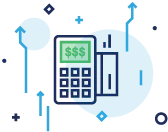A key factor in a successful business is the range of payment methods offered to customers. By understanding the intricacies of each option, businesses can build strategies that make every transaction seamless, secure, and hassle-free.
In this guide, we’ll explore what constitutes a payment method, the most popular types, their pros and cons, and how to choose the right one for your business.
Key Takeaways
- Offering diverse payment methods (credit and debit cards, mobile payments, crypto, etc.) can enhance customer satisfaction. Customers like having options, and this flexibility can boost conversions and turn first-time buyers into repeat customers. In other words, take the time to understand your audience.
- Credit and debit cards remain the most popular and widely accepted payment types, renowned for their convenience and widespread ease of use. However, merchants should always consider fees, processing times, and similar factors when deliberating which payment method would be best for their business.
- Lesser-used methods like ACH and mobile wallets are gaining traction with younger, more international demographics. While these payment methods may not support every business type, consumers are drawn to them for their lower-than-usual fees and expedited transaction times.
- Evaluate your business needs, and the appropriate payment method will present itself. Risk, industry, transaction volume, compliance, and your target audience are variables to consider.
Top 8 Payment Methods
A payment method is the specific form of payment a customer provides in exchange for goods or services. Options ranging from credit and debit cards to checks and good old-fashioned cash are all part of the broader payment processing process that moves money from the customer to your business.
Here are the eight most popular payment types currently used by consumers and businesses, along with their pros and cons:

Credit Card
Credit cards remain the most widely used payment method, with over 31% of consumer transactions being credit card-based as of 2025[1]Expensify. “The State of Credit Cards in 2025: 50 Stats You Need to Know“. Accessed on April 24, 2025.. The process entails using a payment terminal or gateway that routes the credit card information for verification and processing. Credit and debit cards remain popular for their convenience and flexibility. When someone uses a credit card, they are technically drawing from an available line of credit. The parties involved in authorizing a credit card transaction include the customer, the credit card issuer, an acquiring bank, and a payment network[2]Capital One. “How Do Credit Cards Work?“. Accessed on April 24, 2025..
Using a credit card is almost identical to using a debit card, but without using a PIN number: the merchant taps, swipes, or inserts their card into a POS terminal and awaits confirmation of the sale. Credit card users must also pay a monthly balance to keep their FICO rating steady; unpaid balances may subject the cardholder to interest charges.
Pros & Cons of Accepting Credit Cards
| Pros: Ease of use/global popularity. Access to perks and rewards. Ability to build up good credit over time. | Cons: Interest-related charges. Wait times for settling transactions. Irresponsible use can lead to low FICO score. |

Debit Card
Debit cards offer many of the same advantages as credit cards: they’re accepted by most businesses, easy to use, and offer users a streamlined way to manage and organize spending patterns. This method is secure and reliable: for instance, the user doesn’t accrue interest or late fees, as credit card users sometimes do. Customers can use debit cards in person, linked to a digital wallet, or used at an ATM to withdraw cash.
A debit card is quite similar to a credit card, at least on the surface. However, there are important distinctions to consider. Both methods involve tapping, swiping, or inserting a card into a POS terminal. However, with credit, the funds come from the user’s available line of credit. With debit card payments, the funds are taken directly from a user’s checking account. Debit card users must also enter their PIN information to confirm their purchase.
Pros & Cons of Accepting Debit Cards
| Pros: No need to pay a monthly balance. Cash-back accessibility. Almost universally accepted. | Cons: Less secure than credit cards. Limited access to rewards. Spending limits. |

ACH
Transactions completed using ACH, or Automated Clearing House, leverage an electronic network to facilitate the transfer of funds between accounts. This payment method is popular in the B2B (business-to-business) world, as it simplifies electronic deposits and withdrawals.
ACH transfers exist as either credit or debit transfers. The former method is initiated by the party sending the funds, while the latter is undertaken by the party receiving them. Successful completion of an ACH transfer can take several business days and may involve fees for the successful transfer of funds.
Pros & Cons of Accepting ACH
| Pros: Automation convenience. Reduced fees. Works seamlessly with recurring billing. | Cons: Cutoff times for processing batches. Fluctuating transfer limits. Per-transaction and time-based spending limits. |

eCheck
eChecks have become increasingly popular due to their streamlined setup and robust security measures. Processing times are relatively fast (3-5 business days) and generally involve a merchant processor who facilitates and oversees the successful transfer of funds.
The simplest way to think of eChecks is as a digital form of the simple paper check method with which we’re all familiar. eChecks require authorization from the customer and are transferred via ACH. As with a regular check, the funds are withdrawn from the customer’s linked account and verified by the receiving bank.
Pros & Cons of Accepting eChecks
| Pros: Cost-effective and secure. Built-in versatility. Flexibility for small businesses. | Cons: Less popular than credit cards or cash. Longer waiting periods than credit cards. Vulnerable to fraud. |

Mobile Payments
Customers can use smartphones to make mobile payments. This process encompasses various facets, including contactless options and payment apps. Completing a mobile payment consists of linking to a digital wallet, initiating the payment, routing the payment to a designated processor, and verifying and settling the transaction before funds are deposited into the merchant’s account.
Mobile wallets store a customer’s credit or debit card information on a mobile app. The payment is then initiated via NFC technology; popular examples include Apple Wallet and Google Wallet. You can use your mobile wallet on a number of devices, such as a smartphone, tablet, or even certain smartwatches.
Pros & Cons of Accepting Mobile Payments
| Pros: Popular with younger consumers. Robust security measures (tokenization, etc.). Accepted at many contemporary businesses. | Cons: Not universally accepted. Less flexible than digital wallet (in-app only). All sensitive payment information lives on your phone. |

Cryptocurrency
It’s no secret that cryptocurrency acceptance is on the rise. Cryptocurrency payments, arguably the most contentious method on this list, are processed through payment gateways that leverage secure blockchain technology. Despite this method’s inherent volatility, crypto advocates remain confident in its potential for profitability.
Accepting cryptocurrency payments means you must have a crypto wallet and crypto-friendly payment processing set up and ready to go. Crypto is also unique in that a function like crypto exchange allows cryptocurrency to be exchanged for cash. Customers using crypto must stay up-to-date on the latest industry trends and be aware of the inherently risky nature of this particular payment method.
Pros & Cons of Accepting Cryptocurrency
| Pros: Market volatility that can translate to significant financial gains. Exists in multiple varieties. Decentralized, streamlined transfers. | Cons: Not universally accepted.Controversial cultural associations. Built-in volatility that can translate to financial losses. |

Cash
Cash remains the most time-tested payment method, particularly in retail. Why is it so attractive? For one, cash transactions eliminate the hidden fees that sometimes come with credit sales. You don’t need an app or internet connection to accept cash payments. However, customers paying in cash forego their ability to build credit.
Paying with cash is the most straightforward method on this list. The customer simply presents the merchant with a set cash amount in exchange for a product or service. The merchant then provides the requisite change and a receipt for proof of sale. If the customer has provided the exact amount, they will receive no change.
Pros & Cons of Accepting Cash
| Pros: No wait times for transactions to settle.No fees or interest. One of the oldest and most reliable payment methods. | Cons: Limited ability to recover lost or stolen funds. Increasing number of businesses going cash-less. Inability to make online purchases. |

Checks
While the advent of electronic payments has seen checks dwindle slightly in popularity, they still come in handy in certain scenarios. It’s worth noting that checks are also subject to potential fraud risks.
The great thing about a check is that it essentially serves as a record of a certain sum of money to be paid in exchange for goods and services. The check is linked to the customer’s checking or savings account; upon verification of the check, funds are withdrawn from the account in question before being sent to the payee.
Pros & Cons of Accepting Checks
| Pros: Offers a paper trail. One of the most tried-and-true payment methods. Still a popular and widely accepted payment method. | Cons: Vulnerable to fraud. Not environmentally friendly. Costs associated with processing checks. |
Best Payment Methods for Different Business Types and Industries

For better or worse, credit cards remain the most widely accepted payment method among businesses. With that in mind, stores ranging from retail outlets to small boutiques would be wise to implement credit card compatibility at checkout.
Of course, there are also plenty of benefits to using cash. With cash, there’s no waiting for a transaction to settle and, of course, no credit card transaction fees. Merchants accept cash from their customers, provide change and proof of receipt, and the deal is done. However, with more and more businesses opting to go cashless, a cash-only operation risks turning customers away. Street food merchants and laundromats are two examples of businesses that commonly accept cash, thus avoiding the headache of potential chargebacks and credit card processing fees.
Businesses whose clientele consists primarily of millennials and Gen Z’ers should consider offering mobile wallets as a payment option. According to a study performed by PYMNTS in 2024, nearly 80% of Gen Z’ers habitually use digital wallets to complete payments.[3]PYMNTS. “Got Leather? Almost a Third of Consumers Prefer Carrying Physical Wallet“. Accessed on April 24, 2025. eCommerce is a good example of a business that could benefit from offering digital wallet acceptance. According to Independent Banker, the estimation of the popularity of digital wallets in the eCommerce sector is projected to jump to 52% in terms of overall transaction value[4]Independent Banker “How Can Community Banks Ride the Digital Wallet Wave?“. Accessed on April 24, 2025. . Digital wallets can also be useful if a merchant oversees a high-volume, quick-turnaround business, such as a mobile food truck.
Ultimately, there are payment options for every business. Assess your customers’ spending patterns and determine the most convenient options you can offer.
What to Consider when Choosing Payment Options for Your Business
When settling on the right payment options for your business, there’s a fair amount to consider. In making your decision, be sure to keep the following suggestions in mind:
- Understand Your Business Model: Identify the nature of your business (e.g., eCommerce, on-demand services, retail ,B2B) to align payment methods with consumer-specific requirements.
- Know Your Customers: Create a detailed profile of your ideal customer, one that takes age, demographics, and preferred payment methods into account.
- Payment Method Families: Get familiar with prominent payment method families, including options like cards, bank debits, transfers, Buy Now Pay Later (BNPL), and cash-based vouchers.
- Consider Recurring Payments: Prioritize payment methods supporting recurring transactions for a seamless experience.
- Assess Risk Tolerance: Evaluate your business’ risk tolerance and choose payment methods that align with your preferences.
- Prioritize Security and Compliance: Select payment methods with top-notch security and PCI compliance.
Processing Fees. Credit card acceptance and related processing costs may or may not make sense for your business, depending on your industry and the budget you’ve allocated for these specific fees.
How to Choose the Payment Method that is Right for Your Business

Your business can accept payments in both traditional and alternative ways. The appropriate payment method will become evident once you carefully assess your customers and your business’s unique needs.
However, your options for choosing the correct payment method are limited without first setting up a merchant account. Whether you set up shop online or at a brick-and-mortar location, PaymentCloud has the expertise and experience to guide you through the process and meet your specific needs.
Curious about how our services can support your business? Get in touch with us today.
Payment Methods for Small Businesses: FAQs
Which payment method is safest?
Each payment method offers different forms of security. Credit cards and reputable digital wallets generally provide strong security features. Encryption and authentication are two security measures merchants should look out for.
What is the best payment type for small businesses?
The ideal payment method for any small business will depend on factors like transaction volume and customer preference. It is relatively common for small businesses to accept credit and debit cards, cash, and even select digital payments.
What is the most preferred payment method?
Preferences vary among consumers, but credit and debit cards and digital wallets are often among the most preferred payment methods.
What are the different types of cards used for payment?
Common types of payment cards include credit cards, debit cards, and prepaid cards. Each has distinct features, such as debit cards accessing funds directly from a bank account and prepaid cards requiring preloaded amounts.
What are the different types of payment systems for eCommerce businesses?
eCommerce businesses utilize various payment systems, including credit and debit card processing, digital wallets, bank transfers, and BNPL options, allowing customers to make online purchases. The choice of payment systems depends on factors like the target market, transaction volume, and the need for recurring payments.
What is the most common payment method in the US?
Paying in person with credit or debit cards remains the top choice for most American consumers. However, according to Payments and Commerce Marketing Intelligence (PCMI), digital wallets continue to lead the way as a top payment choice in eCommerce.[5]PCMI. “North America’s Most Popular Payment Methods“. Accessed on April 8, 2025.
What is the best way to pay online?
Online merchants are encouraged to support credit card and digital payment options to accommodate potential customers. Credit cards provide multiple layers of security, including fraud detection, while digital wallets offer additional protection through features like passwords and biometric authentication (e.g., facial or fingerprint recognition).







